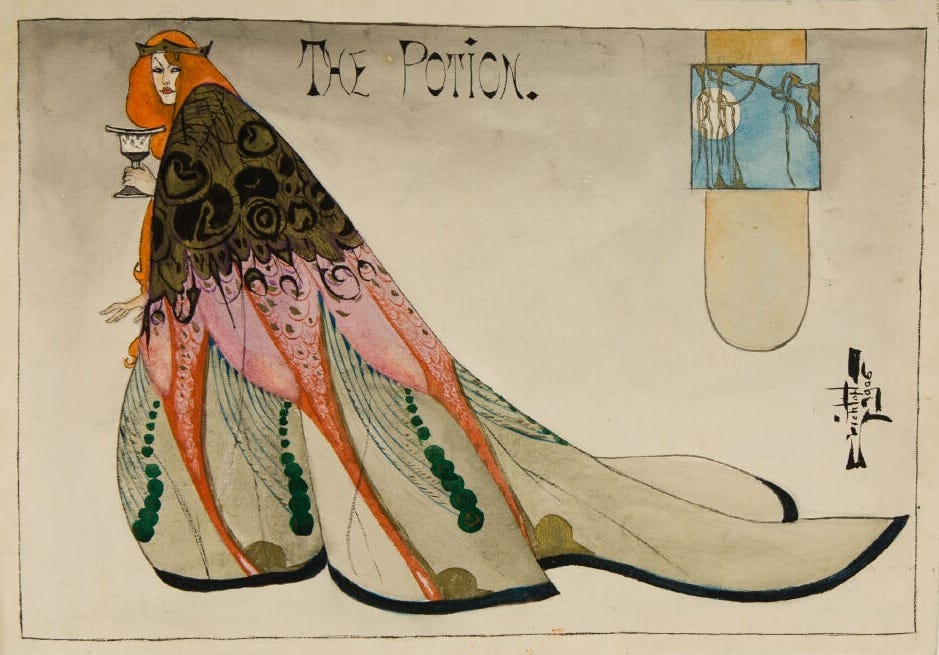Branching Out / Vol. 7
What to listen to next, based on our recent experiences with the music of Thomas Tallis and Henryk Górecki.

Welcome to the seventh edition of Branching Out — where works recently featured in Shades of Blue become your launching point for discovering more melancholy music that cultivates calm, connection, and healing. (If you're a new subscriber, head over here to explore previous installments.)
To grow our tree of classical music knowledge this month, we'll explore music inspired by our recent experiences listening to Thomas Tallis's prayer of piety and hope, Spem in alium, and Henryk Górecki's Symphony of Sorrowful Songs, with its message of love transcending suffering.
So let's dig in and branch out …
If you loved the euphoric polyphony of Tallis's choral work for 40 voices and the ways it manifests hope for a better tomorrow, then listen to …
Johannes Ockeghem / Deo gratia (Thanks Be to God)
As we learned while exploring Thomas Tallis's Spem in alium, much of the music composed during the Renaissance is shrouded in mystery, the people and stories behind its creation muddled by missing or incomplete historical records. Such is the case with Deo gratia à 36, a choral work loosely attributed to the Franco-Flemish composer Johannes Ockeghem, who served in the French court under Charles VII, Louis XI, and Charles VIII.
While we can't be sure Ockeghem — a 15th-century master of polyphony — wrote Deo gratia, there's little doubt as to the intense feelings of euphoric joy this music inspires. Composed for 36 voices (four choirs of nine singers each), the motet evokes a mystical choir of angels, who, over the course of six minutes, offer praise and devotion to God with just two words: Deo gratia.
Each of the motet's four sections revolves around a melody sung in canon — that is, with each singer entering the mix one measure apart. (Think of singing "Row, row, row your boat" in primary school.) As individual voices enter the ever-expanding sea of gratitude, new combinations of harmony and rhythm imbue the music with a rich luster, like lapping waves shimmering in the mid-morning sun.
Although no two voices sing the same material at the same time, Deo gratia achieves a profound sense of unity. Each singer embarks on their own melodic journey, but the canon isn't complete until the final voice to enter has joined its fellow worshippers in singing the melody's final pitch, resulting in a moment of breathtaking unison.
Huelgas Ensemble Paul Van Nevel, conductor
If you were moved by Górecki's meditative song and consoled by its message of love's power to eclipse grief and loss, then spend some time with …
Richard Wagner / Isolde's Liebestod (Love-Death)
In 1854, Richard Wagner wrote to the pianist-composer Franz Liszt:
"Having never in my life enjoyed the true happiness of love, I shall erect a memorial to this loveliest of all dreams in which, from the first to the last, love shall, for once, find utter repletion."
That "loveliest of all dreams" became reality in Tristan and Isolde, Wagner's groundbreaking opera based on the 12th-century Celtic romance between Tristan, a knight in the service of the Cornish King Marke, and the Irish princess Isolde. Despite her engagement to King Marke, Isolde and Tristan fall in love — but when their affair is discovered, the knight is mortally wounded by another of the king's warriors. Isolde rushes to Tristan's side, only to have him die in her arms, her name the final word to pass through her lover's lips.
Rather than descending into unbearable sorrow in the moments following Tristan's death, Isolde experiences a spiritual awakening — a transfiguration inspired by a vision of Tristan's soul rising toward the heavens and becoming one with our vast universe. In hushed tones, she begins to describe the astonishing sight:
How gently and quietly he smiles, how fondly he opens his eyes! Do you see, friends? Do you not see? How he shines ever brighter, soaring on high, stars sparkling around him?
As Isolde's visions grow more intense, the music progresses from earthbound tones in the depths of the orchestra to a swirling kaleidoscope of celestial radiance. Glistening strings and harp soar ever higher to guide Isolde on her spiritual journey, her voice becoming one with the symphony of sound that surrounds her. In a moment of sublime ecstasy, she wills herself to join Tristan in his ascension:
In the surging swell, in the ringing sound, in the vast wave of the world's breath — to drown, to sink unconscious — what supreme rapture!
Isolde dies, her arms still wrapped around Tristan's body. In this act of supreme spiritual fulfillment, death does not mark the end of the couple's love, but its transcendence from the realm of physical existence to an eternal plane of spiritual bliss.
Jessye Norman, soprano Vienna Philharmonic Herbert von Karajan, conductor (Follow along with the German text and English translation.)
I'd love to hear about your experiences listening to these works. Let me know — either by replying to this email or leaving a comment. (And if you enjoyed your time here today, would you ever so kindly tap that little heart below? 👇🏼)
Thank you for reading Shades of Blue!
This newsletter is free, but paid subscribers help support the 20+ hours of research, writing, editing, and production that goes into every essay. If you look forward to reading Shades of Blue when it arrives in your inbox, please consider becoming a paid subscriber.
And remember — the flash sale celebrating Shades of Blue's first birthday ends July 23! Save 20% on a monthly or annual subscription before this offer expires:
Or you can support this newsletter by making a donation through Buy Me a Coffee:






Michael my HEART. Two more soulmates to add to my burgeoning collection. I’ve officially decided I must see a choir(s!) perform a polyphonic work live. I just need to make this happen! “…imbue the music with a rich luster, like lapping waves shimmering in the mid-morning sun”… absolutely yes!! 😍
And meanwhile, I haven’t revisited Liebestod in far too long; this particular recording is otherworldly. The “swirling kaleidoscope of celestial radiance”…I couldn’t put it better if I tried for six months! And I adore how the soft, supple conclusion/coda (starting around 11:50) shakes me to my core just as much as the sweeping crescendo. Watching the two of them perform just puts my soul in a different stratosphere. Plus the English translation!! ❤️🔥
//shall I breathe them,
shall I listen to them?
Shall I sip them,
plunge beneath them
to expire in sweet perfume?//
Thank you for these!!! 💙
Oh goodness me. I'm a little later than usual getting around to this because yesterday I was hard at it preparing my next Substack post. This sat in my in box tantalising me, and I must say that there could not be a better way to soothe my fevered brow than listening to this sublime music and reading your wonderfully informative piece. See the look on von Karajan's face as he listens to Jessye Norman? That's how I feel this morning after reading and listening to Shades of Blue. Thank you, Michael! 💙